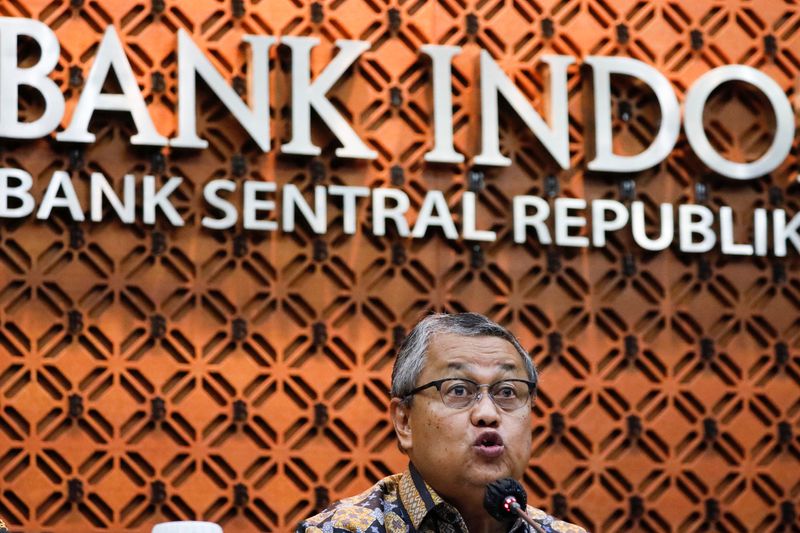By Gayatri Suroyo and Fransiska Nangoy
JAKARTA (Reuters) – Indonesia’s central bank kept its key interest rate unchanged on Thursday, pausing after six consecutive hikes and stressing that the current level should be sufficient to guide inflation back to target, while also revising up its economic growth outlook.
Bank Indonesia (BI) left the benchmark 7-day reverse repurchase rate at 5.75%, as expected by the majority of economists in a Reuters poll.
BI repeated a line first published in its January policy statement that the current benchmark level was adequate to achieve its price stability targets.
The stance highlights a growing policy divide between countries where inflation is slowly easing and those where prices remain elevated, with central banks in many major economies and some neighbouring Asian countries like the Philippines continuing with their tightening.
In the Philippines, where January inflation accelerated to a 14-year high of 8.75%, its central bank raised the benchmark interest rate by 50 basis points to 6.0% on Thursday and flagged its readiness to do more.
By contrast, Indonesia’s inflation peaked at 5.95% in September after the government hiked subsidised fuel prices and cooled to 5.28% in January.
“Core inflation is easing faster than we anticipated … So we view, we believe that the BI policy rate is sufficient,” BI Governor Perry Warjiyo told a news conference.
“Sufficient means no need for more hikes. That is our monetary policy stance,” Warjiyo said.
Warjiyo said this was faster than BI had anticipated. BI aims to get inflation back to within its 2% to 4% target range in the second half of this year and core inflation to stay within the same band throughout the year.
But some economists warned that risks remained because of factors such as interest rate differentials, with the U.S. Federal Reserve likely to raise rates further, as well as a possible flareup in domestic prices again.
“BI will be data dependant with some ammunition in the back pocket, should these risks materialise,” said Irman Faiz, economist at Bank Danamon, who sees BI having room to hike by 25-50 basis points more.
With inflation easing, growth slowing and concerns about the rupiah fading, BI is “unlikely to tighten policy any further this year”, Capital Economics analyst Shivaan Tandon said.
The rupiah, despite some depreciation this month, has remained about 2.5% stronger than at the end of 2022.
Noting risks of further monetary tightening in the United States, Warjiyo stressed that BI would use other tools to maintain rupiah stability to ward off imported inflation, including BI’s plan to launch term deposit instruments for export proceeds.
Starting on March 1, BI will begin to offer 1-, 3- and 6-month forex term deposits for clients of some banks with attractive returns, intended to coax exporters to keep their funds longer onshore.
BI nudged up its economic growth outlook for this year to the upper end of its 4.5% to 5.3% range, or about 5.1%, rather than at the midpoint, after data this month showed Southeast Asia’s largest economy expanded at the fastest pace in nine years at 5.3% in 2022.
Warjiyo attributed the revision to China – Indonesia’s biggest trade partner – removing its zero-COVID policy, which could drive exports, as well as improving private consumption.
(Reporting by Gayatri Suroyo, Fransiska Nangoy; Additional reporting by Stefanno Sulaiman; Editing by Ed Davies, Kanupriya Kapoor)
